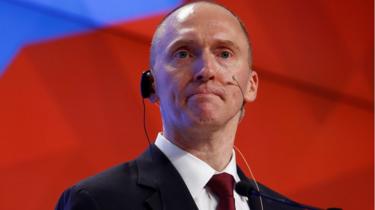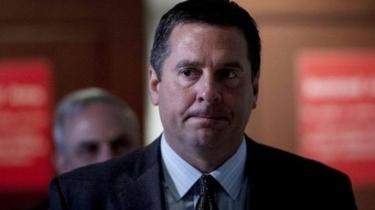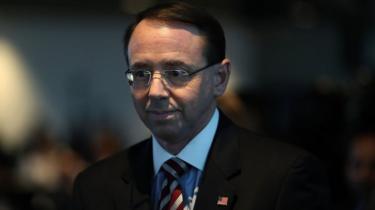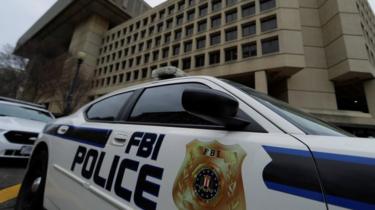A top US Republican, House Speaker Paul Ryan, has played down the potential impact of publishing a memo about FBI surveillance of a former Trump aide.
President Donald Trump is expected to approve releasing the document, which suggests the FBI abused its powers to spy on Carter Page.
Mr Ryan denied the memo was aimed at undermining a federal inquiry into the Trump campaign's links to Russia.
Congress had a duty to see surveillance powers were used correctly, he said.
He was speaking after Democrats portrayed the memo, commissioned by the Republican head of the House Intelligence Committee, Devin Nunes, as an attempt to derail Special Counsel Robert Mueller's investigation.
James Comey, who led the FBI (Federal Bureau of Investigation) at the time of the 2016 election and who was sacked by the new president, suggested the agency was being subjected to a witch hunt by "weasels and liars".
What's in the secret memo?
Approved by the House Intelligence Committee on Monday, the document reportedly accuses the FBI and justice department of misleading a judge in March of last year while seeking to extend a surveillance warrant against Mr Page.
The memo is said to argue the FBI and justice department did not tell the judge that some of their justification for the warrant relied on a much-disputed Trump dossier.
Compiled by a former British intelligence agent, Christopher Steele, that dossier was financed in part through the campaign of Democratic presidential candidate Hillary Clinton to dig up dirt on Mr Trump.
Unnamed sources told Reuters news agency the Republican memo was misleading because all the dossier excerpts used in the FBI warrant application were independently confirmed by US intelligence.
- All you need to know about Trump Russia story
Who's who?
 REUTERS
REUTERS- Carter Page, 46, a foreign policy adviser to the Trump campaign, visited Russia several times in 2016. He adamantly denies allegations in the Trump dossier that he served as an intermediary between Russian officials and the Trump campaign.
 AFP
AFP- Devin Nunes, 44, has long been pursuing President Trump's claims that he was put under surveillance by the Obama administration - so much so that the congressman was dubbed "Inspector Clouseau" by a fellow Republican, Sen Lindsey Graham, in March .
 GETTY IMAGES
GETTY IMAGES- Rod Rosenstein, 53, was appointed deputy attorney general last April, He is said by the New York Times to have been involved at various points in authorising applications for the surveillance. President Trump questioned his loyalties in December, CNN reports.
How united are Republicans over the memo?
"It is our job, as the legislative branch of the government, to conduct oversight over the executive branch if abuses were made," Mr Ryan said."What this is not, is an indictment on our institutions, of our justice system. This memo is not [an] indictment of the FBI, of the Department of Justice. It does not impugn the Mueller investigation, or the deputy attorney general."However, another Republican member of the House who read the memo, Jeff Duncan, predicted in a tweet that the memo would shake the FBI "down to its core".It would, he said, show "Americans just how the agency was weaponised" by officials from Barack Obama's administration and the Democratic Party to "target political adversaries".However, there has been a degree of unease among some other Republican representativesover the risk of compromising intelligence-gathering, NBC reports."We run the risk of exposing some sensitive sources and methods," said one, Charlie Dent.Why are Democrats calling for Mr Nunes to go?
- Congressional Democratic leaders called on Thursday for Mr Nunes' immediate removal as chairman of the House Intelligence Committee.Democratic Congressman Adam Schiff accused Republicans of having amended the memo after it was approved.However, an unnamed Republican aide said the amendments were grammatical changes and "minor edits", including two tweaks requested by the FBI and by Democrats.
How's the FBI itself responding?
 REUTERSIt has voiced "grave concerns about material omissions of fact that fundamentally impact the memo's accuracy".The justice department, which oversees the FBI, has warned the memo's release could jeopardise intelligence-gathering and damage trust between the agency and lawmakers.Pressure has mounted on the FBI, which is the subject of a forthcoming inspector general report.Its deputy director, Andrew McCabe, resigned on Tuesday. He had been repeatedly accused of political bias by President Trump.
REUTERSIt has voiced "grave concerns about material omissions of fact that fundamentally impact the memo's accuracy".The justice department, which oversees the FBI, has warned the memo's release could jeopardise intelligence-gathering and damage trust between the agency and lawmakers.Pressure has mounted on the FBI, which is the subject of a forthcoming inspector general report.Its deputy director, Andrew McCabe, resigned on Tuesday. He had been repeatedly accused of political bias by President Trump.What happens next?
While President Trump is expected to approve the memo's release, the exact method for publishing it is "still being figured out", the Associated Press news agency reports.As president, Mr Trump has the power to declassify the document himself and either release it or hand it to Congress to release.
No comments:
Post a Comment